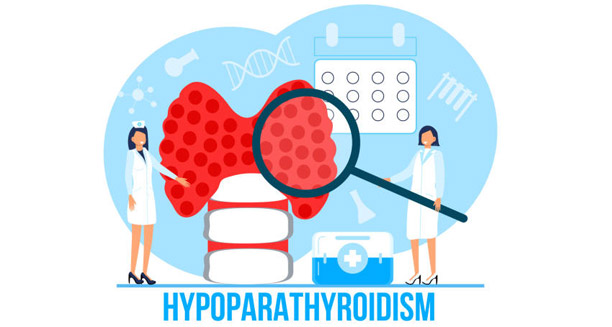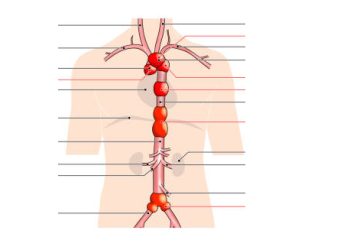Hypoparathyroidism is a rare endocrine disorder characterised by insufficient production or action of parathyroid hormone (PTH), which results in abnormally low levels of calcium in the blood (hypocalcaemia) and elevated phosphorus levels (hyperphosphataemia). This imbalance causes a wide range of neuromuscular, cognitive, and systemic symptoms. Some symptoms can become life-threatening if left untreated. Although hypoparathyroidism is less common than hyperparathyroidism, it poses unique challenges in diagnosis and treatment.
What Is Parathyroid Hormone?
Parathyroid hormone (PTH) plays a crucial role in keeping blood calcium levels stable. It acts mainly on three organs:
- Bones: PTH stimulates calcium release by breaking down bone tissue.
- Kidneys: It reduces calcium loss in urine and increases phosphate elimination.
- Intestines: PTH indirectly boosts calcium absorption by activating vitamin D.
These actions help nerves, muscles, and cells work properly. In hypoparathyroidism, low PTH leads to poor calcium release from bones, less absorption in the gut, and too much calcium lost through urine. This combination causes persistent low calcium levels.
Defining Hypoparathyroidism
Hypoparathyroidism happens when one or more parathyroid glands fail to make enough PTH. This results in dangerously low blood calcium and a rise in phosphate. The condition may appear suddenly, often after thyroid surgery, or slowly develop due to autoimmune or genetic causes. Sometimes it is temporary, but often it is permanent.
Unlike many hormonal diseases, hypoparathyroidism does not trigger a feedback loop to increase PTH. The body cannot fix calcium levels on its own, which makes managing this condition challenging.
Common Symptoms
Most symptoms of hypoparathyroidism relate to low calcium levels and include:
- Tingling or numbness in fingers, toes, and lips
- Muscle cramps and spasms (tetany)
- Fatigue and irritability
- Seizures in severe cases
- Hair thinning, brittle nails, and dry skin
- Dental issues such as enamel defects in children
- Memory problems and difficulty concentrating
Without treatment, symptoms worsen and can cause serious complications like cataracts, brain calcifications, and heart rhythm problems. Early detection is vital.
Types of Hypoparathyroidism
Hypoparathyroidism comes in several types based on the cause:
- Post-surgical Hypoparathyroidism: The most common form, caused by damage or removal of parathyroid glands during thyroid or neck surgery.
- Autoimmune Hypoparathyroidism: When the immune system attacks the glands. Often part of autoimmune polyglandular syndrome type 1 (APS-1).
- Genetic or Congenital Hypoparathyroidism: Present from birth due to gene mutations affecting gland development or hormone production. Sometimes linked with syndromes like DiGeorge syndrome.
- Idiopathic Hypoparathyroidism: When no cause is found after thorough testing. Genetic or autoimmune causes may still be discovered later.
- Pseudohypoparathyroidism: Normal or high PTH levels but tissues don’t respond to it, leading to similar symptoms.
Who Is at Risk?
Though rare, hypoparathyroidism affects certain groups more:
- People who have had thyroid or neck surgery
- Those with autoimmune diseases, especially polyglandular syndromes
- Individuals with family history of hypoparathyroidism or genetic syndromes
- Infants born with congenital gland abnormalities
- Patients with magnesium imbalances that lower PTH secretion
Because symptoms can mimic anxiety, epilepsy, or fibromyalgia, hypoparathyroidism is often missed or misdiagnosed.
The Global Impact
Hypoparathyroidism affects an estimated 24 to 37 people per 100,000 worldwide. Women and patients after surgery represent most cases. Many remain undiagnosed, especially in areas with limited healthcare resources. Raising awareness among doctors and patients can reduce delays in diagnosis. Early treatment greatly improves outcomes. Research continues to develop better management options.
Importance of Timely Diagnosis and Care
Early diagnosis is critical due to the risk of serious complications. While no cure exists for most cases, daily calcium and active vitamin D supplements help maintain safe calcium levels. New treatments like recombinant PTH therapy offer hope for better control.
Patients often need regular monitoring, kidney function checks, and multidisciplinary care to adjust medications and avoid complications like kidney calcifications or heart problems.
Summary
The overview of hypoparathyroidism shows it is a rare but serious disorder caused by low parathyroid hormone production or function. It affects many body systems and can arise from surgery, autoimmune reactions, genetics, or unknown causes. Despite its complexity, early diagnosis and proper treatment allow most patients to lead stable, active lives. Ongoing research promises further improvements for this challenging condition.


